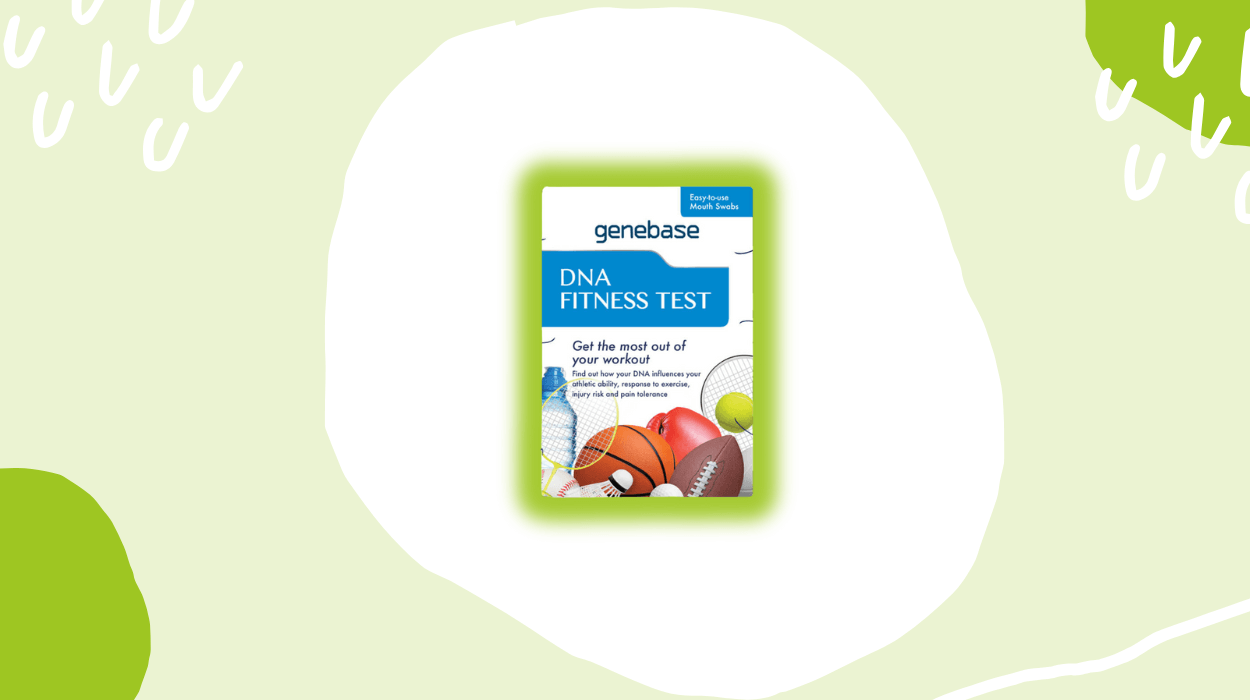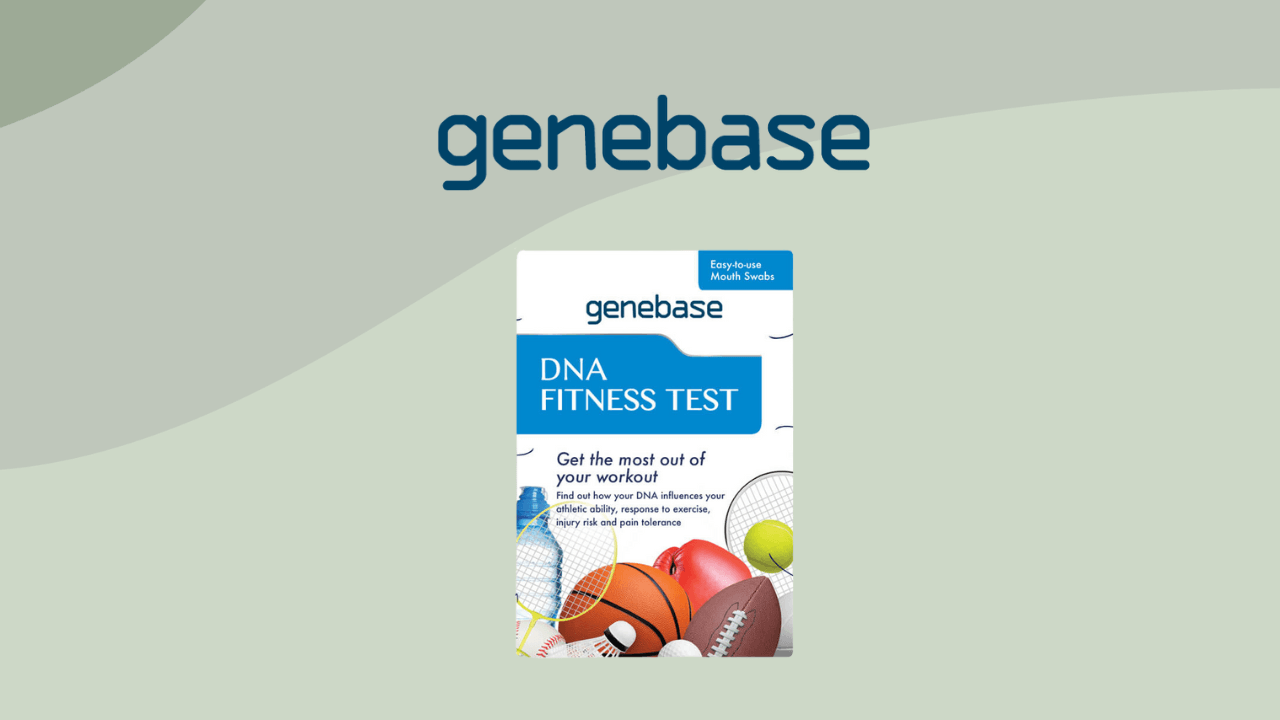

The Genebase DNA Fitness Test may help uncover the genetic factors that could influence your fitness potential and exercise performance. It may analyze specific genetic variants, which could provide insights into your muscle type, endurance, and recovery capabilities.
As per the makers, the test may further highlight how genetic factors influence motivation, heart rate recovery, and pain tolerance, offering guidance that may help you optimize your training and avoid unnecessary setbacks.
In this review, we examine different aspects of the Genebase DNA Fitness Test, including how the testing process works, what genetic understandings are provided, and whether that can help improve your workouts. The review further explores the benefits and potential limitations associated with the test.
According to the official site, the Genebase DNA Fitness Test is an at-home genetic testing kit that analyzes how your DNA may influence your exercise performance. It provides details on specific genetic markers associated with power, muscle type, endurance, recovery, and pain tolerance.
The test analyzes specific gene variants, such as PPARGC1A, PPARD, and MCT1, which could help understand how your body may respond to exercise. It might also help explore factors like why you are better at endurance training exercises, such as running or swimming, or why resistance training exercises are more challenging for you.

As per the official site, the Genebase DNA Fitness Test kit is shipped to your location. Inside the package, you receive the necessary supplies, including swabs for collecting your DNA sample, instructions on how to perform the test, and a prepaid return envelope.
The makers mention that you should begin by conducting a simple, non-invasive cheek swab, which you should gently rub against the inside of your mouth. After collecting the sample, place it back in the container provided and send it to the Genebase-affiliated laboratory using the prepaid return option.
Once the lab processes your DNA, the testing results are uploaded to your secure online account. At this stage, you can log in to the Genebase portal and access the available web apps. These apps may allow you to review your genetic testing data and explore the information presented in your report.
As per the manufacturer, the Genebase DNA Fitness Test begins when you collect your DNA sample using a painless cheek swab.
Once your sample is sent back, the laboratory extracts and analyzes your DNA to identify specific gene variants linked to exercise response, metabolism, muscle composition, and injury risk.
The test focuses on single-nucleotide polymorphisms (SNPs) and small genetic variants that may influence how your body responds to physical activity. For instance, the ACTN3 gene determines whether you produce α-actinin-3, which is a protein in fast-twitch muscle fibers associated with sprinting and explosive power.
Meanwhile, the ACE gene insertion/deletion (I/D) variant is examined for its connection to endurance versus strength performance. Other genes like PPARA, PPARD, and PPARGC1A may influence how your muscles adapt to endurance training, while MCT1 could impact lactate clearance, influencing how quickly you recover between periods of high-intensity exercise.
The findings from the test may help you understand your body’s natural tendencies and potential limitations. For example, if your genes suggest a higher injury risk due to variants in collagen-related genes such as COL1A1 or COL5A1, you should try to focus more on mobility, prehabilitation, and gradual progression.
Similarly, markers in genes like VEGFA, which affect blood vessel formation, may indicate how efficiently your muscles receive oxygen and nutrients during training. Even genes related to stress and pain tolerance, such as COMT, provide insight into why you may perceive exercise differently than others.
The Genebase DNA Fitness Test looks at specific gene variants that affect muscle performance and fiber composition. Your muscles contain both fast-twitch and slow-twitch fibers. Fast-twitch fibers are built for quick, explosive movements like sprinting or lifting heavy weights. Slow-twitch fibers are better for long-lasting activities such as running or cycling because they resist fatigue.
As per the official site, the test analyzes specific gene markers, such as the ACTN3 gene, which is linked to speed and power output, while the ACE gene may influence strength or endurance. It also checks for gene markers like MCT1, which influences lactate clearance in the body to support faster recovery. With these details, you can build an exercise routine that matches your genetics. It may help you train more efficiently, see faster progress, lower your chance of injury, and recover more efficiently post-workouts.
The Genebase DNA Fitness Test may offer details regarding your pain tolerance. As per the official site, it analyzes the COMT gene, which helps influence brain neurotransmitters like dopamine, adrenaline, and norepinephrine. These neurotransmitters may influence how sensitive you are to pain, whether you feel pain more strongly or have a higher tolerance for it.
Analysis of the COMT gene through the test may help you adjust your training routine. If you are more sensitive, you may need lighter-intensity workouts, longer recovery time, or mental strategies to stay consistent. On the other hand, if your tolerance is higher, you may be able to train harder without feeling as much strain. Such details might help you avoid overtraining, lower your risk of injury, and improve physical performance.
According to the official site, the Genebase DNA Fitness Test analyzes genetic variants that have undergone studies in Caucasian populations only. It may imply that the scientific links between the genes and traits like endurance, strength, recovery, or injury risk are based primarily on research involving European ancestry.
Genetic variants may behave differently in other ethnic groups because the frequency of some gene versions (alleles) and their interactions with other genes can vary between populations. For instance, a variant associated with higher muscle strength in Europeans may not have the same effect in East Asian, African, or Hispanic populations.
Because the test has limited validation across diverse populations, its predictions may be less accurate for non-Caucasian users. You might receive training or recovery recommendations that do not fully reflect your actual genetic traits, which may reduce the reliability of the results from the test.
With the Genebase DNA Fitness kit, there’s a potential for making errors during at-home sample collection. As you are responsible for swabbing your own cheek and preparing the sample, mistakes like not swabbing long enough, contaminating the swab, or failing to seal the container properly might affect the quality of your DNA sample. It may increase the risk of compromised or insufficient DNA for analysis or errors in labeling or packaging, which may lead to inconclusive or unreliable results. Such concerns might contribute to misleading recommendations about your endurance, strength, recovery, or injury risk. These issues may cause delays, add inconvenience, and reduce the reliability of your testing experience.
Both the LivingDNA Wellbeing Kit and the Genebase DNA Fitness Test provide fitness information based on analysis of specific genetic markers.
However, the kits differ in some aspects. The LivingDNA Wellbeing Kit provides information on how genetics influences factors like muscle recovery time, oxygen flow, strength, tendon durability, and vascular response.
Meanwhile, the Genebase DNA Fitness Test concentrates on supporting athletic performance by an analysis of gene-based markers that influence aspects like endurance, power output, exercise response, motivation, recovery times, injury risk, and pain tolerance.
Another point of distinction is the transparency regarding the specific gene variants analyzed by the kits. The official LivingDNA Wellbeing Kit site does not specify the genes analyzed once your DNA sample is sent to LivingDNA-affiliated labs.
On the other hand, the Genebase DNA Fitness Test examines a detailed set of specific genes, including PPARD, VEGFA, ACE, ADRB2, and PPARA. PPARGC1A, PPARD, and MCT1 genes are analyzed for exercise response, while the ACVR1B and IL6 genes are assessed for their link to muscular strength.
Pricing is another point of difference between the kits. For example, the LivingDNA Wellbeing Kit is currently priced in the range of $105–$110, which otherwise retails at around $145–$150.
On the other hand, the Genebase DNA Fitness Test is priced within the range of $245–$250, as part of a one-time purchase. Neither LivingDNA nor Genebase has specified a definite results turnaround time on their official page, leaving you to contact their respective customer support for details if needed.
When comparing the AlterMe Swab Kit for DNA Fitness and the Genebase DNA Fitness Test, both kits differ in aspects like their core focus, genetic traits covered, and pricing structures.
The AlterMe Swab Kit emphasizes a broad approach to DNA fitness and health, which includes testing and understanding covering strength, oxygen flow testing, recovery tendencies, blood vessel response, and tendon durability.
Meanwhile, the Genebase DNA Fitness Test concentrates more on genetic influences related to athletic ability, exercise response, injury risk, pain tolerance, and response to exercise.
The AlterMe Swab Kit for DNA Fitness analyzes 60 polymorphisms tied to 13 essential traits in fitness, including areas like recovery, exercise, nutrition, and sleep. However, the specific gene names covered in the testing are not detailed on its product page.
On the other hand, the Genebase DNA Fitness Test explicitly lists multiple gene variants that it analyzes, including the PPARD, VEGFA, ACE, ACTN3, MCT1, ADRB2, and IL6 genes. Aspects like endurance, strength, response to exercise, and athletic power categorize such genes.
In terms of holistic integration and privacy practices, there are further differences between the products. For example, the AlterMe Swab Kit for DNA Fitness provides a detailed report on 13 essential gene-related traits, accompanied by a free 1:1 walkthrough session with a fitness expert to interpret your results.
AlterMe also promises guarantees of DNA privacy, including de-identification and rigorous security measures to keep your DNA sample data confidential.
Meanwhile, the Genebase DNA Fitness Test provides insights via the Genofit app for workout optimization, focusing on muscle type benefits and injury risks, without mention of personalized expert consultations.
In terms of result turnaround time, there are further differences. For instance, AlterMe claims to make available your DNA fitness testing result within 7-10 days after sample submission.
On the other hand, the Genebase DNA Fitness Test does not specify a turnaround time for results on its product page, leaving potential gaps in transparency.
In evaluating the Genebase DNA Fitness Test, we considered the brand’s background and ratings across independent review forums.
Genebase is a Vancouver-based brand that specializes in DNA testing services, offering kits that test for ancestry, health, lifestyle, and behavioral traits. It holds an “A+” rating with the Better Business Bureau. Such a rating might positively indicate the brand’s reliability and responsiveness to customer issues. However, Genebase lacks a profile on Trustpilot, limiting visibility into customer experiences.
Although Genebase showcases credibility in its core offerings, especially in ancestry and genealogy testing, its lack of independent third-party reviews is a potential limitation to consider.
The Genebase DNA Fitness Test can help you understand how your genes influence muscle composition, recovery timelines, exercise response, and injury risk. Such findings are then integrated with the Genofit app, which might help translate the results from genetic testing into training suggestions and recovery strategies.
However, its genetic associations are based mainly on studies of Caucasian populations, which may reduce the relevance of the results, especially if you do not have a non-Caucasian ancestry.
Moreover, the accuracy of testing outcomes may depend on whether or not you follow proper at-home sample collection procedures, where a minor error in sample collection on your part may compromise results.
However, you should also view the results from the Genebase DNA Fitness Test as a complementary resource rather than an actual assessment of your fitness. It does not account for your training history, diet, or sleep.
Contact us at [email protected] or follow @leafsnap on Twitter! View our Privacy Policy.